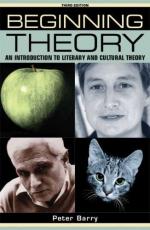
|
| Name: _________________________ | Period: ___________________ |
This quiz consists of 5 multiple choice and 5 short answer questions through Post-structuralism and deconstruction.
Multiple Choice Questions
1. According to the narrator in the Introduction, the ________ probably saw the high-water mark of literary theory.
(a) 1990s.
(b) 1960s.
(c) 1970s.
(d) 1980s.
2. According to Peter Barry, where does post-structuralism ultimately derive from?
(a) Zoology.
(b) Philosophy.
(c) Physics.
(d) Pyschology.
3. The Introduction states that ________, like novelists, are dauntingly plentiful.
(a) Journalists.
(b) Romanticists.
(c) Theorists.
(d) Poets.
4. The narrator states that the study of English literature was seen as a kind of substitute for ________.
(a) Social studies.
(b) Religion.
(c) History.
(d) Science.
5. The chapter titled Theory Before Theory--Liberal Humanism states that the conventional reading of the origins of the subject of English is that this kind of thinking begins with who?
(a) John Webster.
(b) Edwin Abbott.
(c) Matthew Arnold.
(d) Thomas Malory.
Short Answer Questions
1. What was another name for the semic code found within the chapter titled Structuralism?
2. Who was appointed Professor at King's College, London in 1840?
3. Author Peter Barry suggests that the reader uses a useful form of intensive reading known as ________.
4. The notion of the ________, posited by Levi-Strauss, denoting the minimal units of narrative "sense," is formed on the analogy of the morpheme, which, in linguistics, is the ________ unit of grammatical sense.
5. Which of the following term best can be defined as one in which we cannot know where we are, since all the concepts which previously defined the center, and hence also the margins, have been "deconstructed," or undermined?
|
This section contains 254 words (approx. 1 page at 300 words per page) |

|




